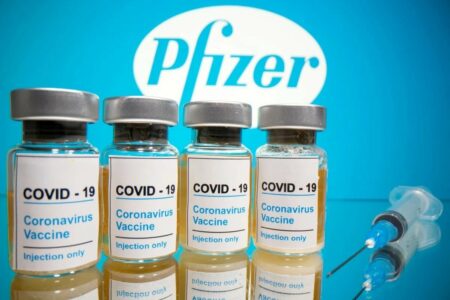Many experts have focused on nanoparticles of the messenger RNA delivery system, which contain polyethylene glycol.
The United States also experienced a severe allergic reaction after the UK experienced a severe allergic reaction during the emergency vaccination of the novel coronavirus vaccine. This has attracted the attention of scientists. What exactly is the ingredient that triggers the allergic reaction?
According to a recent report released by Thomas Clark of the Centers for Disease Control and Prevention (CDC), 272,001 people in the United States had been vaccinated against COVID-19 as of December 19, including six allergic reactions.
On December 8th, local time in the United Kingdom, two medical staff developed a severe allergic reaction after being vaccinated against the same Pfizer coronavirus vaccine. In response, the British drug regulator subsequently issued a warning to remind people with a history of severe allergies not to be vaccinated against the novel coronavirus vaccine, and an investigation was also launched into the incident.
Because Pfizer and Moderna mRNA vaccines use new platforms, the allergic reactions caused need to be carefully examined, said Elizabeth Phillips, a drug allergy researcher at Vanderbilt University Medical Center.
On December 21, officials of the National Institute of Allergy and Infectious Diseases (NIAID) said that the United States was preparing to conduct a study on the serious allergic reaction of some people after receiving Pfizer’s coronavirus vaccine.
Although no scientific conclusion has been given to what exactly the ingredients triggered the allergic reaction of Pfizer’s coronavirus vaccine, many experts have focused on nanoparticles of the messenger RNA delivery system, which contain polyethylene glycol.
On December 21, Science published an article saying that it is suspected that nanoparticles in Pfizer’s coronavirus vaccine will trigger a rare allergic reaction, which is the compound polyethylene glycol.
The article said that in the past two weeks, at least eight people have had a severe allergic reaction to the coronavirus vaccine produced by Pfizer and BioNTech.
Polyethylene glycol is a compound. Its series of products are non-irritating, slightly bitter, have good water solubility, and have good solubility with many organic compounds. They have excellent lubrication, moisture retention, dispersion and adhesives.
They can be used as antistatic agents and softeners. They have been widely used in cosmetics, pharmaceuticals, chemical fibers, rubber, plastics, papermaking, paints, electroplating, pesticides, metal processing and food processing industries.
“Polyethylene glycol plays a stabilizing role, increasing the stability and validity period of vaccines. It’s just that polyethylene glycol is the first time used in a human vaccine. It is known to cause life-threatening allergic reactions such as dyspnea, rapid drop in blood pressure, and rapid heartbeat.” A virologist said.
Polyethylene glycol has never been used in approved vaccines, but it exists in many drugs that can trigger allergic reactions, which is a potentially life-threatening reaction. It can cause rash, sudden drop of blood pressure, shortness of breath and faster heartbeat.
Some allergists and immunologists believe that a few people who have previously been exposed to polyethylene glycol may have high levels of polyethylene glycol antibodies, putting them at risk of allergic reactions to the vaccine.
Both vaccines produced by Pfizer and Moderna use lipid nanoparticles to wrap the vaccine ingredients in them, which help carry vaccine ingredients to human cells and also act as an adjuvant, which is a vaccine component that enhances the immune response.
In response to this possibility, Alkis Togias, head of the NIAID division of allergy, asthma and respiratory biology, told the media on Monday that the study is still in the early stage of planning and that the study is expected to include “hundreds” of people with a history of severe allergic reactions.
His department will lead the study, and the researchers hope to start the study in a few weeks, but the exact time is uncertain.
While only people currently vaccinated with Pfizer have reported these reactions, this study may examine both Pfizer and Moderna-produced vaccines.
Polyethylene glycol has long been thought to be biologically inert, but there is growing evidence that this is not the case.
According to a 2016 study led by Samuel Lai, a pharmacologist at the University of North Carolina at Chapel Hill, up to 72 percent of people have at least antibodies against polyethylene glycol, which may be caused by exposure to cosmetics and drugs.
He found that about 7% of people’s antibody levels may be high enough to induce allergic reactions. Other studies have also found antibodies against polyethylene glycol, but at lower levels.
Finding the culprit of allergic reactions will be an important task of the National Institute of Allergy and Infectious Diseases in the coming weeks.



